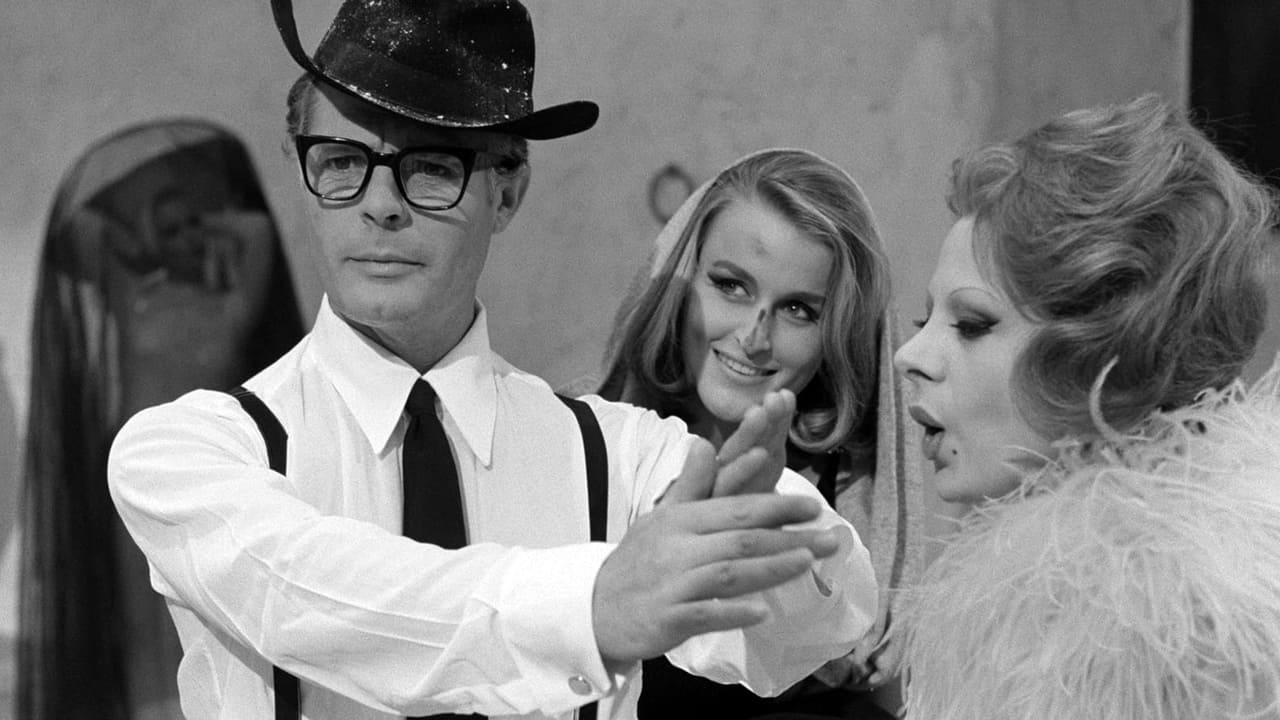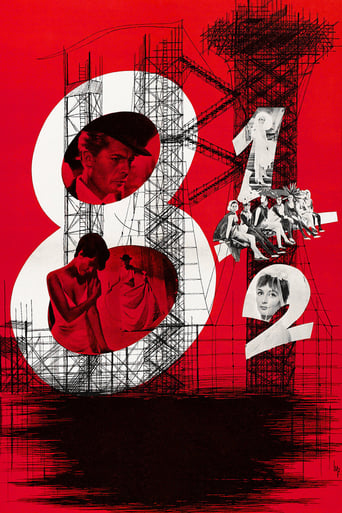

Tied for the best movie I have ever seen
... View Moregood back-story, and good acting
... View MoreIn truth, there is barely enough story here to make a film.
... View MoreLet me be very fair here, this is not the best movie in my opinion. But, this movie is fun, it has purpose and is very enjoyable to watch.
... View MoreFor the sake of this review, I am going to assume that Fellini was trying to make a movie, got stuck, and finally decided the best way forward is to make a movie about how difficult it is to make a movie. Apologies to history if that's not what happened. There are lessons I have resonated with in this movie that I have not commonly seen in reviews, so I thought I would jot them down for others. I hope they are helpful:1. You will get stuck in life. Even if you are doing something you are good at and enjoy. There are moments where you will not be able to finish something, or maybe start something, that is important to you.2. If you are headed in a direction that is unproductive or will cause you pain, take the time necessary to stop and recognize the fact that it temporarily sucks. Based on the content and themes in the film I am assuming Fellini had this moment of realization. 3. Reflect. The visions and dreams in this movie are a beautiful representation of the importance of reflecting on who you are or the experiences that have shaped you. You do have to face reality, but roots are important and do influence who we are and the way we see the world. Guido's conversation with the priests is a perfect example. Is the main character religious? It's complicated. And this brief conversation makes the memory of his childhood so important. 4. Be willing to give it up. When he makes the decision to cancel the production, Guido loses the white-knuckle grip he had on having to get it done, which led to his epiphany that he had everything he needed for his movie right in front of him. The order of this is important. If he would have remained unwilling to lose it, he would have either finished something he was unhappy with or it would have never seen the light of day. Neither of those options would have led to 8 1/2. 5. Be bold. There were many voices in his life telling Guido to be different than who he was. There was unnecessary time pressure, high expectations, actors and actresses wanting answers or they were not going to get involved, blah blah blah. He was the only person who could make the final movie, as was Fellini. There are some things that only you can do. Once you find that thing, be bold and believe that you are the best in the world at it. You don't have to brag, just know it. It will dramatically impact your confidence and most likely results. Thank you for reading if you made it all the way through.
... View MoreEIGHT AND A HALF is a fantasy comedy drama about the problems of an artist during his creative process. However, this film is much more than that. This is the story of all of us, the quest for meaning and aspirations for better quality of life.A famous Italian film director, is suffering from "director's block". His upcoming science - fiction film contains some autobiographical references. However, he is torn between marital and business problems. He is resting in a luxury spa center. His friends, associates, mistress and wife "enjoy" along with him. More specifically, they destroy his personality. His anxiety and confusion are a growing problem. He has recurring visions of his ideal woman, which he sees as key to his story. The film production crew relocates to his hotel in an attempt to get him to work on the movie, but he evades his staff, ignores journalists, and refuses to make decisions, not even telling actors their roles. He retreats into himself and begins to search for meaning...The story about a consciousness, memories and dreams, through a strange blend of satire and grotesque, describes a psychoanalysis of one character. A fake luxury and life in a high society are part of a masterful deception by Mr. Fellini. He has made a strange relation between the real and an imaginary world, however, the main protagonist does not feel free in any of these worlds. The main protagonist has actually reconsidered his feelings and fears. His experiences are traces of his life. He is trying, through his experiences, to find a man who is lost in the real world. He has to cope with his own ego, women and business. I think, that he is trying to escape from his own reality, to another, which would become, with certain modifications, again his.The photography and direction are excellent, characterization is almost perfect.Marcello Mastroianni as Guido Anselmi is a film director, who is trapped between his ambition and his dream. A man who is not capable for love, must dream and hallucinate. Mr. Mastroianni has offered a phenomenal performance.Anouk Aimée (Luisa Anselmi) is a jealous wife, who wants to change her husband habits. Sandra Milo (Carla) is a charming and somewhat strenuous mistress. She is in total contrast with Louisa's character. Claudia Cardinale (Claudia) is a girl from Guido's dreams and forgotten voice of reason. There is a boring French actress, "a Gothic face" and a mysterious and seems lonely lady from their hotel. Basically .... women.This is an ironic, romantic and charming masterpiece.
... View MoreI found this film to be an emotional roller-coaster ride. Many things are being said about the opening sequence. Terry Gilliam claims it to be the most important film sequence in his life, and I can see why. Like the overture of an opera, it captures all the conflict and all the drama that is laid out through the rest of the film. It grabs you and will not let you go anymore.It wasn't possible for me to sit through the first viewing, because I was too repulsed by all the sociable chatter in the first half of the film. I got the point Fellini wanted to make (I think), but I still couldn't take it. But the opening sequence was so incredible, that I decided to continue watching the film where I had last stopped. What I got was like a hot and cold shower.Alternating between the chaos and the madness that Guido's life is, and calm, isolated settings, the film comes at us like waves. In his more introspect moments, Guido is usually talking to a female character, and it is here that his visions and his demons are revealed to us. The way he opens up to his sister beneath the spaceship scaffolding reminds of the struggle of an artist who tries to create something personal which he beliefs will not only lift himself above everything, but others, too. His more stable sister just laughs at his pathos and self-pity.We also meet him as the egocentric, irresponsible character that he is. He discards women that do not physically attract him anymore with the strictness of a World War II general. Claudia Cardinale, his muse, confronts him with the sobering fact that he does not know how to love.It all culminates in a press conference that Guido is forced to attend because his producer is putting the pressure on him. Facing the whirlwind of questions from the reporters, and having no answers, he decides to escape by crawling beneath the table and shoot himself. Whether it is fantasy or reality, we don't know, and it doesn't seem important. The movie ends on an up because Guido somehow manages to find a way out of his isolation and to embrace the people, characters and collaborators that accompany and form his life.A very personal film. I think the opening sequence will be a good indicator whether you will relate to it or not.
... View MoreWell, i think this is my favorite movie from Fellini, because hit me in the topics that i like. I like to see when the dreams or things related to these are very important in a movie, (remember Mulholland Dr.), in many parts of the movie is difficult to recognize what is a dream and what is the real life of the protagonist. The story of this movie is really good, but bizarre, and for me it was very enjoyable. This movie was a unexpected journey in how strong are the feelings in the life of the protagonist, i think the movie develops from this point, but this is an atypical movie because the way it is told, the dreams tell us what is really the protagonist, and see the mix between dreams, real life and feelings in the story is simple and awesome. This is my first review in IMDb, and i hope be useful.
... View More